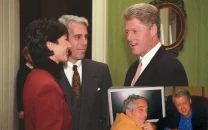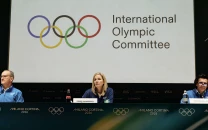British-Pakistani journalist sues CNN for unfair dismissal
Saima Mohsin calls out broadcaster for disability, racial discrimination post on-assignment injury in Jerusalem

British-Pakistani journalist Saima Mohsin said on Monday that she is suing CNN for unfair dismissal, disability and racial discrimination after being fired post a severe injury while on assignment in Israel.
“We risk our lives in the field trusting we’ll be taken care of,” wrote Mohsin on Twitter, sharing her decision.
“CNN wants my case thrown out,” she said, adding that it was a big week for her at the Employment Tribunal – a judicial body in the United Kingdom responsible for deciding on legal disputes between workers and employers.
“I was injured on assignment for CNN. They fired me,” wrote Mohsin.
I was injured on assignment for CNN
— Saima Mohsin (@SaimaMohsin) July 10, 2023
They fired me
We risk our lives in the field trusting we’ll be taken care of
I’m suing for unfair dismissal, disability & race discrimination. CNN wants my case thrown out
Big week for me at Employment Tribunal 🤲🏾 https://t.co/QYvOrB3LpH
Shedding light on the matter, The Guardian reported that Mohsin was left disabled after an accident while reporting from Jerusalem on the Israel-Palestine conflict.
Read Award-winning journalist Saima Mohsin opens up about her 'crippling' health issues
Her cameraman ran over her foot in a car, causing severe tissue damage that has left the British-Pakistani journalist struggling to sit, stand and walk or return to work full-time.
After the incident in 2014, the foreign correspondent claims she requested alternative duties and support for rehabilitation but CNN refused.
She also alleges that she asked CNN if she could switch to a presenting role in order to reduce the amount of time spent travelling but was told “You don’t have the look we are looking for”. Three years later the channel terminated her contract.
She said she had decided to bring the employment tribunal claim, which is due to be heard in London today because the network had failed to support her after the life-changing injury.
“I worked hard to become an international correspondent and loved my job with CNN. I risked my life many times on assignment for CNN believing they would have my back. They did not.”
Mohsin’s claim also alleges race and disability discrimination, as well as a complaint about the gender pay gap at CNN. She claims she was denied high-profile on-air opportunities, with managers choosing to put white American correspondents on air even when she was ready to go live on the ground.
The Guardian reported that CNN declined to comment on the allegations. The broadcaster is opposing the claim on territorial grounds, arguing that the terms of Mohsin’s contract mean she does not have the right to bring a case in London.
The case comes at a tricky time for the broadcast news network, which has made deep job cuts and is dealing with the fallout from a number of scandals, missteps and struggling ratings in its core US market.
Longtime boss Jeff Zucker left last year over a relationship with a colleague, while his replacement Chris Licht lasted only a year before being sacked. The news channel also finds itself in the middle of a corporate restructuring at parent company Warner Bros Discovery.
Read More WLIP demands better protection for female lawyers
Mohsin now presents programmes for Sky News on a freelance basis and has made a programme for ITV about the pain of living with invisible disabilities.
She is being represented by barristers Paras Gorasia and Jennifer Robinson of Doughty Street Chambers, who also acted for cricketer Azeem Rafiq in his claim against Yorkshire County Cricket Club.
The presenter said her claim raised important questions about journalist safety and the treatment of women of colour in journalism: “This should cause concern for all foreign correspondents who travel around the world – and take risks to do their journalism in the belief their employer will take care of them”.
“I’m also taking the opportunity to highlight the racism and gender pay gap issues that I experienced. I was repeatedly let down and denied the ability to achieve my potential while I was at CNN. I am bringing my claim to take a stand and call for change to ensure women journalists, and women journalists of colour, are better protected,” she said.



















COMMENTS
Comments are moderated and generally will be posted if they are on-topic and not abusive.
For more information, please see our Comments FAQ